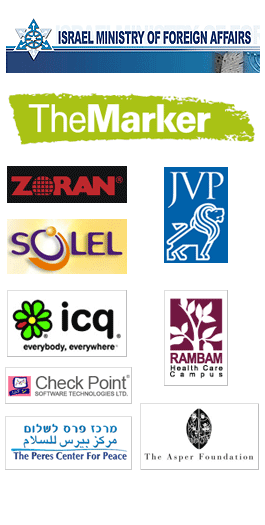Rambam’s Trauma Care in Peace Time & WAR Time
by Renee Blodgett on April 14, 2008 at 12:00 pm
From chips to healthcare, we leave Zoran in Haifa and drive north to Rambam, one of Israel’s five major hospitals and the only tertiary care center serving the northern third of the country. They take ‘everyone’ in, so an Israeli soldier could be lying next to an Arabic terrorist. IDF soldiers, UN and US Sixth Fleet troops have all passed through these doors. Some never leave.
The center was named after Rabbi Moshe Ben-Maimon “the RAMBAM,” the greatest Jewish physician of ancient times.
A photographer follows us all into a large overly air conditioned room (I think Israelis ‘think’ that yanks need to have rooms at subzero temperatures because its so hard to find a public space in the states that isn’t “iced”…). It turns out that he typically shoots body parts during an operation.
Rambam’s Director of Public Affairs David Ratner talks to our group. We learn a bit about its history before we get the ‘emotional story.’ It was built in 1938 by the British as a government military hospital. They now take in roughly 83,000 annually, and there are 120,000 emergency department visits and 44,000 surgical procedures.
All of this is handled by only 700 physicians; 23% of these doctors are Jewish, Muslum and Christian Arabs. Located only 35 kilometers from the Lebanese border, they have gained international recognition in trauma medicine since they took care of so many wounded during war time. They’re also making significant progress in stem cell and genetic research.
They host a trauma program four or five times a year where doctors from around the world can come and learn ‘best practices’ of what the Rambam medical team learned while under attack.
When missiles started hitting in June 2006, patients were admitted to Rambam from various sources: from deadly missile attacks in the immediate vicinity, from other hospitals unable to handle the injuries and from helicopters who were bringing in wounded from the border. Today, they treat a lot of people from the West Bank. Arabs and Jews. This is not an issue.
The medical center is also located between two navy bases. During times of peace, there is an area that is being used as a parking lot. During war time, it would only take 72 hours for them to turn this lot into a place where they can treat an additional 750 people.
Trauma comes to them in many forms. David reminds us that a bus accident full of injured children is far worse than three soldiers who have been shot.
Rambam is also doing a lot of work cardiac tissue engineering. Rambam and Technicon are both working on combining cardiac stem cells and polymer to generate artificial cardiac contracting sheet.
This center deserves more recognition than it has received worldwide – perhaps not enough people know. The Rambam Healthcare Center an amazing example of co-existence in Israel and how life ‘could be.’



